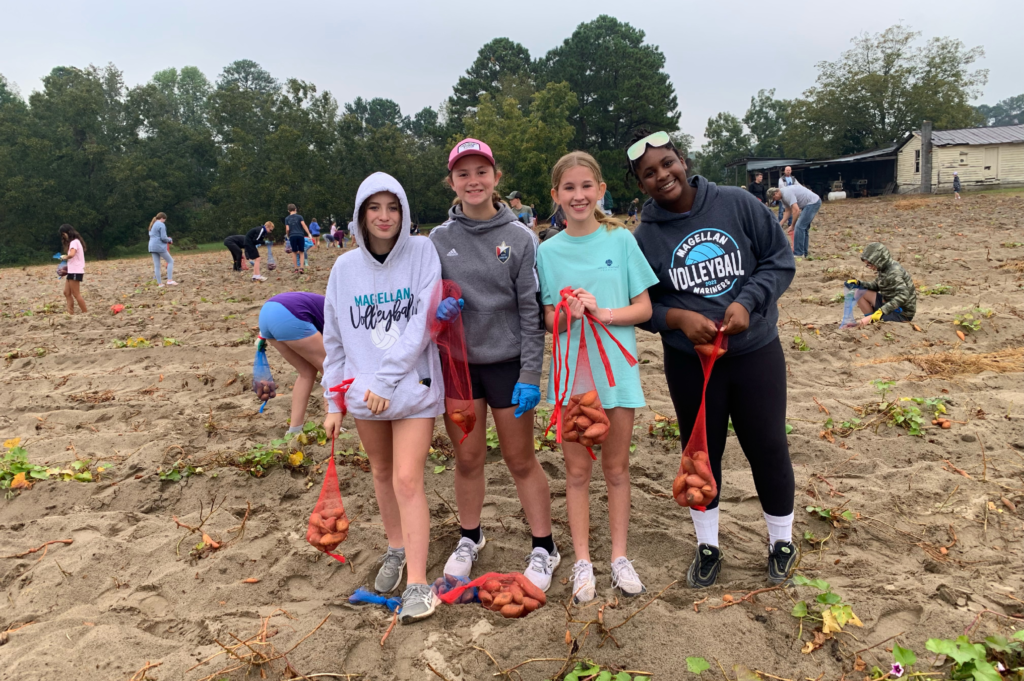
Language Arts:
In the seventh grade Language Arts course at Magellan, students focus on polishing their communication and analytical skills. Inspired by the standards of the Common Core curriculum in English Language Arts and Literacy, the class includes strategies for critical reading of fiction books, informational articles, poetry, and drama. Students encounter and grapple with texts in a variety of ways, including through independent reading, book clubs, and whole-class study. Further, students hone their writing skills by working in a variety of genres, with argumentative writing as a special focus. Participants in this class will present and evaluate information and ideas as they demonstrate their speaking and listening abilities. Study of vocabulary through Greek and Latin roots and a deeper understanding of grammar rules are also crucial parts of this class. As we build our reading, writing, and language skills, we will integrate social studies and science content, technology, and the arts whenever possible.
Social Studies:
In seventh grade social studies, students study the modern world from the Age of Exploration (1400-1800) to the present, focusing on patterns of continuity and change. Our study of this modern world will be organized around five strands: history, geography and environmental literacy, culture, government, and economics. The unifying theme for our class is “Global Connection” and we will consistently define and redefine this concept throughout the year as we study each historical era. As students study world events and conditions, they will be asked to make connections, to research, to observe cause and effect, to predict, to analyze, to problem solve, and to create with the goal of gaining insight into the development of our modern world today. Students will develop historical thinking skills such as interpreting primary resources, using multiple perspectives and sources to explain historical events, analyzing and constructing geographical maps, and connecting the past to our lives today. Students will learn through experience and take an active, student-centered approach in the classroom where students will participate in simulations, engage in debates and Socratic seminars, analyze artwork and primary resource, and investigate and propose solutions to the historical and current problems in our world.
Math:
Guided by a problem-solving middle school philosophy, the curriculum incorporates a wide range of activities and a variety of approaches designed to help students think critically and creatively as well as to develop their basic skills. To best meet the educational needs of all students, we offer three courses of math study. Students are placed either in seventh-grade math, pre-algebra, and algebra based on their level of skill. These courses encourage mastery of computational skills as well as provide problem-solving strategies that enhance students’ abilities to make practical applications of these concepts in everyday life.
Science:
Science in the seventh grade focuses on a wide variety of topics that students can directly apply to their everyday lives. Students build on themes that they are exposed to in earlier years as well as being introduced to new subjects. Studies dealing with the atmosphere and air quality will set the foundation for our later topics of weather, which are continued in more depth this year. Our genetics unit will help students construct patterns of inheritance, as well as understand the relationship of the mechanisms of cellular reproduction, utilizing mitotic and meiotic division for example. Other topics of study will include an understanding of the processes, structures and functions of living organisms that enable them to carry out the basic functions of life. Seventh graders will also understand motion, the effects of the forces on motion, and encounter studies on energy transfer, transformation, and conservation within our physics unit of study.
As students have a wide variety of learning styles, an assortment of teaching techniques are used including note taking, labs, role play/simulation, cooperative groups, discussions, and hands-on projects to reach all students. One example of the activities students might participate in is the production of a 3-D model of an animal or plant cell, which serves as a creative way for students to share their knowledge. Another example of student learning is when students take on the role of their teacher and teach mini-lessons covering one or two systems of the human body; students are given the opportunity to demonstrate their knowledge and learn from each other.
